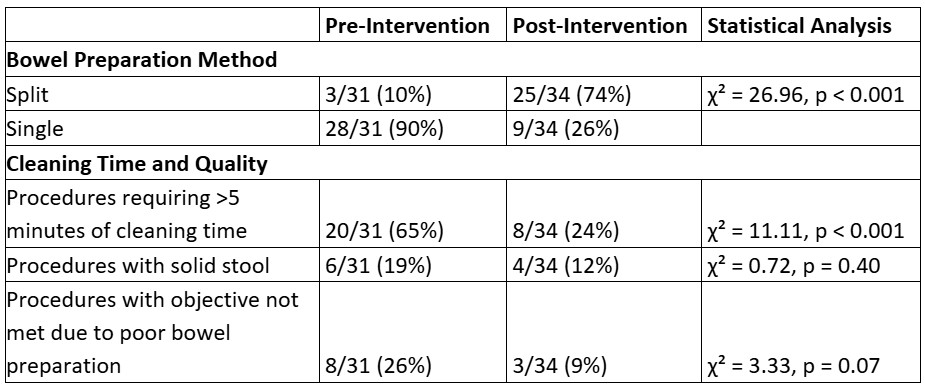Monday Poster Session
Category: Colorectal Cancer Prevention
P2653 - Prepping for Success: A Multimodal Quality Improvement Initiative to Implement Split-Dose Bowel Preparation at a Safety Net Hospital
Monday, October 27, 2025
10:30 AM - 4:00 PM PDT
Location: Exhibit Hall

Lynn Leveille, MD (she/her/hers)
University of Miami Miller School of Medicine at Jackson Memorial Hospital
Miami, FL
Presenting Author(s)
Lynn Leveille, MD1, Ami Panara Shukla, MD2
1University of Miami Miller School of Medicine at Jackson Memorial Hospital, Miami, FL; 2University of Miami Health System, Miami, FL
Introduction: Inadequate bowel preparation compromises colonoscopy effectiveness, leading to missed lesions, prolonged procedures, and inefficient resource use. An initial assessment at our large safety net hospital revealed over 50% of outpatient colonoscopies required more than 5 minutes of intraprocedural cleaning. We implemented a quality improvement (QI) initiative focusing on split-dose preparation and enhanced patient education with the goal of decreasing the proportion of procedures requiring significant cleaning by 30%.
Methods: A prospective IRB-exempt QI study compared pre- (n=31) and post-intervention (n=34) colonoscopy outcomes. Key interventions included implementing a split-dose bowel preparation protocol in the 3 most common languages, creating an electronic order set with new preparation as default, and offering both verbal and email patient education consistently. Primary outcomes measured Boston Bowel Preparation Scale (BBPS) scores, percent procedures requiring >5 minutes of cleaning, percent procedures with solid stool and those unable to complete objective due to preparation. Secondary outcomes assessed patient satisfaction and educational resource preferences.
Results: Split-dose preparation use increased from 10% (3/31) to 74% (25/34) post-intervention (χ² =26.96, p< 0.001). Mean BBPS scores improved from 6.5 to 8.2, with segment-specific improvements. The proportion of procedures requiring >5 minutes of cleaning decreased from 65% (20/31) to 24% (8/34) (χ²= 11.11, p< 0.001), meeting our goal. Patients noted phone calls between one day to one week pre-procedure and emailed instructions as the most beneficial educational resources. Patients requested further visual aids depicting expected stool appearance and simplified materials with fewer words and more images.
Discussion: This QI initiative demonstrates the effectiveness of a multi-faceted approach to improving bowel preparation quality at a safety net hospital. Enhanced multimodal patient resources and stakeholder collaboration enabled streamlined care coordination essential to improving bowel preparation. The dramatic reduction in procedures requiring extended cleaning time (65% to 24%) represents substantial efficiency gains and resource optimization. Future directions include enhancing visual educational materials. These findings underscore the importance of both evidence-based preparation protocols and patient-centered education strategies in optimizing colonoscopy outcomes.

Figure: Table 1. Comparison of Bowel Preparation Methods and Procedural Outcomes Before and After Implementation of Split-Dose Protocol.
Disclosures:
Lynn Leveille indicated no relevant financial relationships.
Ami Panara Shukla indicated no relevant financial relationships.
Lynn Leveille, MD1, Ami Panara Shukla, MD2. P2653 - Prepping for Success: A Multimodal Quality Improvement Initiative to Implement Split-Dose Bowel Preparation at a Safety Net Hospital, ACG 2025 Annual Scientific Meeting Abstracts. Phoenix, AZ: American College of Gastroenterology.
1University of Miami Miller School of Medicine at Jackson Memorial Hospital, Miami, FL; 2University of Miami Health System, Miami, FL
Introduction: Inadequate bowel preparation compromises colonoscopy effectiveness, leading to missed lesions, prolonged procedures, and inefficient resource use. An initial assessment at our large safety net hospital revealed over 50% of outpatient colonoscopies required more than 5 minutes of intraprocedural cleaning. We implemented a quality improvement (QI) initiative focusing on split-dose preparation and enhanced patient education with the goal of decreasing the proportion of procedures requiring significant cleaning by 30%.
Methods: A prospective IRB-exempt QI study compared pre- (n=31) and post-intervention (n=34) colonoscopy outcomes. Key interventions included implementing a split-dose bowel preparation protocol in the 3 most common languages, creating an electronic order set with new preparation as default, and offering both verbal and email patient education consistently. Primary outcomes measured Boston Bowel Preparation Scale (BBPS) scores, percent procedures requiring >5 minutes of cleaning, percent procedures with solid stool and those unable to complete objective due to preparation. Secondary outcomes assessed patient satisfaction and educational resource preferences.
Results: Split-dose preparation use increased from 10% (3/31) to 74% (25/34) post-intervention (χ² =26.96, p< 0.001). Mean BBPS scores improved from 6.5 to 8.2, with segment-specific improvements. The proportion of procedures requiring >5 minutes of cleaning decreased from 65% (20/31) to 24% (8/34) (χ²= 11.11, p< 0.001), meeting our goal. Patients noted phone calls between one day to one week pre-procedure and emailed instructions as the most beneficial educational resources. Patients requested further visual aids depicting expected stool appearance and simplified materials with fewer words and more images.
Discussion: This QI initiative demonstrates the effectiveness of a multi-faceted approach to improving bowel preparation quality at a safety net hospital. Enhanced multimodal patient resources and stakeholder collaboration enabled streamlined care coordination essential to improving bowel preparation. The dramatic reduction in procedures requiring extended cleaning time (65% to 24%) represents substantial efficiency gains and resource optimization. Future directions include enhancing visual educational materials. These findings underscore the importance of both evidence-based preparation protocols and patient-centered education strategies in optimizing colonoscopy outcomes.

Figure: Table 1. Comparison of Bowel Preparation Methods and Procedural Outcomes Before and After Implementation of Split-Dose Protocol.
Disclosures:
Lynn Leveille indicated no relevant financial relationships.
Ami Panara Shukla indicated no relevant financial relationships.
Lynn Leveille, MD1, Ami Panara Shukla, MD2. P2653 - Prepping for Success: A Multimodal Quality Improvement Initiative to Implement Split-Dose Bowel Preparation at a Safety Net Hospital, ACG 2025 Annual Scientific Meeting Abstracts. Phoenix, AZ: American College of Gastroenterology.

